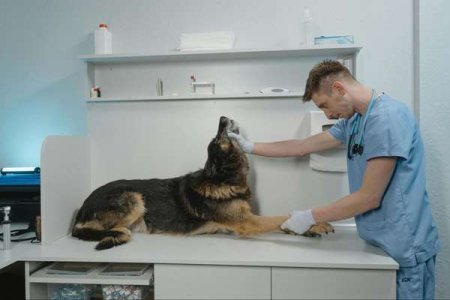Are Your Furry Friends Putting Your Health at Risk? CDC Uncovers Shocking New Findings on Dog-Transmitted Diseases!
As we cherish the companionship of our furry friends, it's crucial to stay informed about their health—not just for their sake, but for ours too.
Recent reports from the Centers for Disease Control and Prevention (CDC) have raised eyebrows and concerns among pet owners and public health officials alike. It turns out, our beloved pet dogs might be unsuspecting carriers of two rare but potentially serious diseases.
Let's delve into the details and understand what precautions we can take to protect both our four-legged pals and ourselves.
The Unsettling Discovery of Antibiotic-Resistant Bacteria in Dogs
The first of the CDC's reports, published in March 2023, identified two cases in New Jersey where a golden retriever and a cocker spaniel became infected with a multidrug-resistant strain of Pseudomonas aeruginosa. This bacteria bears a worrying resemblance to the culprit behind an 81-person outbreak earlier that year. The dogs, both treated at the same veterinary facility, likely contracted the pathogen there.
Pseudomonas aeruginosa is notorious for its resistance to many antibiotics, making infections difficult to treat and raising concerns about the potential for human transmission. The bacteria can cause a range of illnesses, from minor ailments like swimmer's ear to severe, life-threatening conditions, particularly in individuals with weakened immune systems.
The CDC's investigation into the veterinary facility uncovered lapses in hand hygiene, personal protective equipment (PPE) protocols, and cleaning procedures. These findings underscore the critical need for stringent infection control measures in healthcare settings, including veterinary clinics.
The Mysterious Fungal Infection: Blastomycosis in Dogs and Humans
On the same day, the CDC released a second report detailing an outbreak of blastomycosis in Wisconsin during 2022. This fungal infection, caused by the Blastomyces fungus, affected five people and six dogs who had inhaled spores present in soil and decaying leaves.
While direct transmission from dogs to humans is extremely rare, the shared environment where dogs and their owners spend time, such as wooded trails, could expose both to the risk of infection.
Blastomycosis is a serious lung infection that can lead to symptoms like fever, cough, chest pain, and fatigue. In severe cases, the infection can spread beyond the lungs to other parts of the body, including the brain and spinal cord.
The CDC estimates that blastomycosis infects around 6,700 Americans annually, resulting in approximately 60 deaths.
The CDC's report highlighted that dogs who roamed off-leash on trails or lived closer to the rivers were more likely to have antibodies against Blastomyces, suggesting a higher risk of exposure in these areas.
Protecting Yourself and Your Pets
These reports serve as a reminder of the interconnectedness of human and animal health. As we cherish the bond with our pets, it's essential to take proactive steps to protect both their well-being and our own. Here are some measures you can take:

Have you or your pets ever encountered health issues related to these findings? Do you have additional tips for keeping our furry friends and ourselves healthy? Share your stories and advice in the comments below.
Recent reports from the Centers for Disease Control and Prevention (CDC) have raised eyebrows and concerns among pet owners and public health officials alike. It turns out, our beloved pet dogs might be unsuspecting carriers of two rare but potentially serious diseases.
Let's delve into the details and understand what precautions we can take to protect both our four-legged pals and ourselves.
The Unsettling Discovery of Antibiotic-Resistant Bacteria in Dogs
The first of the CDC's reports, published in March 2023, identified two cases in New Jersey where a golden retriever and a cocker spaniel became infected with a multidrug-resistant strain of Pseudomonas aeruginosa. This bacteria bears a worrying resemblance to the culprit behind an 81-person outbreak earlier that year. The dogs, both treated at the same veterinary facility, likely contracted the pathogen there.
Pseudomonas aeruginosa is notorious for its resistance to many antibiotics, making infections difficult to treat and raising concerns about the potential for human transmission. The bacteria can cause a range of illnesses, from minor ailments like swimmer's ear to severe, life-threatening conditions, particularly in individuals with weakened immune systems.
The CDC's investigation into the veterinary facility uncovered lapses in hand hygiene, personal protective equipment (PPE) protocols, and cleaning procedures. These findings underscore the critical need for stringent infection control measures in healthcare settings, including veterinary clinics.
The Mysterious Fungal Infection: Blastomycosis in Dogs and Humans
On the same day, the CDC released a second report detailing an outbreak of blastomycosis in Wisconsin during 2022. This fungal infection, caused by the Blastomyces fungus, affected five people and six dogs who had inhaled spores present in soil and decaying leaves.
While direct transmission from dogs to humans is extremely rare, the shared environment where dogs and their owners spend time, such as wooded trails, could expose both to the risk of infection.
Blastomycosis is a serious lung infection that can lead to symptoms like fever, cough, chest pain, and fatigue. In severe cases, the infection can spread beyond the lungs to other parts of the body, including the brain and spinal cord.
The CDC estimates that blastomycosis infects around 6,700 Americans annually, resulting in approximately 60 deaths.
The CDC's report highlighted that dogs who roamed off-leash on trails or lived closer to the rivers were more likely to have antibodies against Blastomyces, suggesting a higher risk of exposure in these areas.
Protecting Yourself and Your Pets
These reports serve as a reminder of the interconnectedness of human and animal health. As we cherish the bond with our pets, it's essential to take proactive steps to protect both their well-being and our own. Here are some measures you can take:
- Practice Good Hygiene: Wash your hands thoroughly after handling pets, especially if they are sick or have been in a veterinary clinic.
- Stay Informed: Keep up to date with any health advisories in your area, particularly if you live near natural environments where fungal spores may be present.
- Regular Vet Visits: Ensure your pets receive regular check-ups and that veterinary clinics follow proper infection control practices.
- Monitor Your Pet's Health: Be vigilant for any signs of illness in your pets, such as coughing, lethargy, or loss of appetite, and seek veterinary care promptly.
- Protect Your Environment: Be cautious when disturbing soil or leaves, and consider wearing a mask in areas where fungal spores may be present.
Key Takeaways
- Pet dogs in the United States have been found to carry dangerous pathogens that could pose a threat to human health, according to new CDC reports.
- Two New Jersey dogs became infected with an antibiotic-resistant bacteria, and a veterinary facility is believed to be the common source.
- A separate CDC report highlighted an outbreak of a fungal infection from blastomycosis in dogs and humans in Wisconsin.
- The CDC studies underline the importance of monitoring pet dogs for pathogens that could potentially infect humans, and highlight potential risks in certain environments, including veterinary facilities and outdoor areas with disturbed soil.
Have you or your pets ever encountered health issues related to these findings? Do you have additional tips for keeping our furry friends and ourselves healthy? Share your stories and advice in the comments below.








